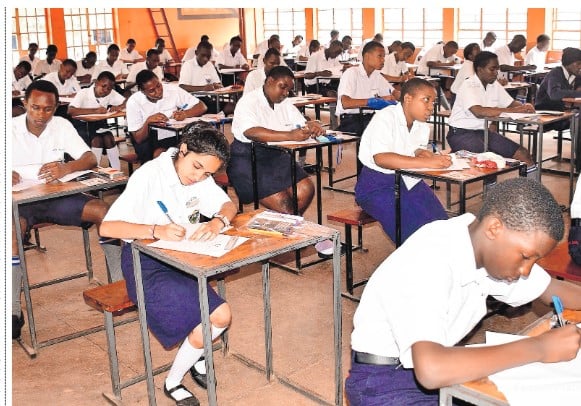Exams don’t have to be stressful

Students of Kitante High School sitting the Mathematics Paper on October 14, 2024. PHOTO/STEPHEN OTAGE
What you need to know:
- Pressure, in moderation, can catalyse improvement, pushing individuals to strive for excellence. However, when it becomes overwhelming, it turns into a formidable adversary, potentially triggering mental health challenges and undermining academic performance.
As we find ourselves amidst the hustle and bustle of another exam season, a question arises: are schools inadvertently putting too much pressure on our children?
This concern is especially pertinent as schools gear up for the final Uneb examinations. Undoubtedly, these exams represent a crucial milestone in every student's academic journey, but how we approach this period can profoundly impact their wellbeing and long-term success.
Pressure, in moderation, can catalyse improvement, pushing individuals to strive for excellence. However, when it becomes overwhelming, it turns into a formidable adversary, potentially triggering mental health challenges and undermining academic performance.
The signs are visible: children burdened with relentless study schedules, sacrificing weekends and personal time, often exhibit signs of fatigue and stress-induced lethargy. This isn't mere conjecture but a stark reality observed in many educational settings.
Schools want their children to pass excellently but I feel it's not necessary again to exert more pressure on them. They have already devoted children to countless hours of studying, waking up before dawn, and sacrificing leisure time for academic pursuits.
Perhaps now is the time to afford them some breathing room, to trust in their preparation, and allow them to approach exams with a sense of calm and confidence. It is of no value again to intensify too much pressure in the remaining days.
In some schools, children start classes as early as 4 am and continue until 10pm daily. They also have classes at the weekends, leaving them with little time to rest. I have observed that some children under such pressure sleep excessively during the holidays because their bodies are already fatigued.
They even confess to feeling overwhelmed by the pressure to excel. It becomes even more concerning when parents fail to recognise this or choose not to listen to their children. They often interpret resting as laziness, assuming children cannot be as productive at home as expected.
Take the time to listen and understand your child. As they grow, we are very observant and know what they can and cannot do. If you notice changes in their productivity or if they seem less interested in activities they once enjoyed, take a keen interest and investigate what might be troubling your child before passing judgment.
It is crucial to foster open communication and attentively listen to children's concerns. Recognising changes in their behaviour or productivity can offer valuable insights into their mental state and readiness for exams.
Some teachers compare our children with others and add other negative comments to them.
This affects their emotional stability and affects their self-esteem and confidence. All children are unique and cannot perform the same way. Also, schools are under pressure because of competition.
They want to become the best in final examinations so that they can get more learners or keep the standard. This pressure for public image is consumed by our children and teachers. Schools can avoid comparing themselves with others and stop staging stiff competition, which adversely affects our children and this can significantly reduce stress levels, among students.
Equipping children with stress management techniques is as crucial as imparting academic knowledge. These skills empower them to navigate periods of anxiety and stress with resilience and composure.
Simple practices such as mindfulness exercises, time management strategies, and fostering peer support networks can go a long way in promoting wellbeing and academic success.
Peer-to-peer support can be a potent remedy for exam-related stress. Encouraging students to form discussion groups allows for collaborative learning and a deeper understanding of complex subjects.
Sometimes, explanations from peers resonate better than those from teachers, fostering a supportive learning environment where everyone can thrive.
Let the primary children take adequate rest, manage their time well, and prepare well for the remaining period. They don’t need to work under panic yet you have given them what is adequate to enable them to pass.
Feed them well. Teach them to make a timetable and read on their own, ensuring that they can balance all the subjects during revision.
In conclusion, as we navigate through this exam season, let us heed the call to alleviate unnecessary pressure on our children. Let us foster an environment where they can excel, not just academically but also emotionally and socially.
By doing so, we not only enhance their chances of success in exams but also equip them with invaluable life skills that will serve them well beyond the confines of the classroom.
Together, let us make this exam season a time of growth, resilience, and meaningful learning experiences for our children.
Dickson Tumuramye, Executive Director of Hope Regeneration Africa, parenting coach, marriage, and founder of the Men of Purpose mentorship programme.



